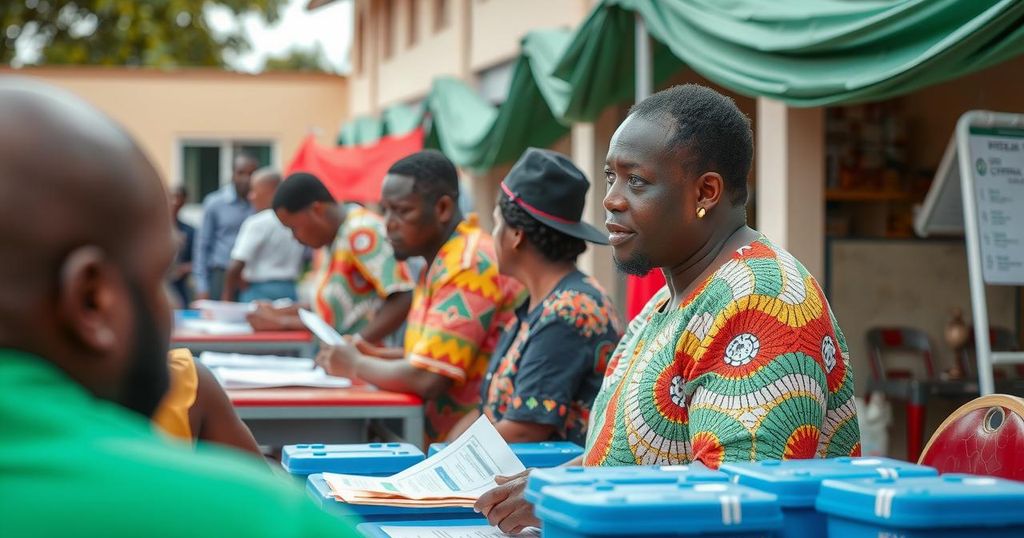Ghana Elections: A Democratic Test Amid Economic Turmoil
Polls have opened in Ghana for presidential and legislative elections amidst a severe economic crisis, with 18.7 million registered voters. The election is primarily a contest between Vice President Mahamudu Bawumia and former President John Dramani Mahama, with both candidates offering similar solutions to the economic woes. The country faces high inflation, unemployment, and issues relating to illegal gold mining. Voter sentiment is largely influenced by dissatisfaction with the current economic direction.
Ghana commenced its presidential and legislative voting on Saturday amidst an ongoing economic crisis that overshadows the electoral process. Approximately 18.7 million citizens are eligible to cast their votes in what is perceived as a significant test for democracy within a region fraught with extremist turmoil and political unrest from coups. Once hailed as a model of democratic governance in West Africa, Ghana faces severe economic challenges, including soaring inflation and high unemployment rates. An Afrobarometer survey revealed that 82% of Ghanaians believe their country is heading in the wrong direction.
Despite the presence of 12 candidates in the presidential race, it is primarily viewed as a contest between Vice President Mahamudu Bawumia of the ruling New Patriotic Party (NPP) and former President John Dramani Mahama of the opposition National Democratic Congress (NDC). The NPP has struggled to address the country’s economic hardships, while Mahama was ousted in 2016 after failing to revive the economy during his tenure. Both parties market themselves as having different ideologies, yet their proposed solutions appear largely similar, according to analysts.
Ghana’s parliamentary elections will also see 276 members elected, with the NPP and NDC currently holding an equal number of seats in the legislature. In their final campaign appearances, both candidates attempted to persuade voters that their parties could reverse the country’s economic decline. Bawumia, an experienced economist, emphasized continuity in policy measures to stabilize the economy, whereas Mahama called for a complete “reset” of governance and other crucial sectors.
While enthusiasm is noticeable in the capital, Accra, with rallies and public displays in support of candidates, voters remain acutely aware of the pressing economic situation. The nation is grappling with a significant debt crisis, having defaulted on foreign debt obligations, which has led to hikes in prices for essential goods. Inflation peaked at 54% last year, and though it has decreased slightly, many Ghanaians still feel the pinch at the marketplace. Furthermore, the rampant issue of illegal gold mining, or ‘galamsey’, persists as a critical concern, affecting the environment and the economy as individuals turn to these means in desperation for employment.
The article discusses the presidential and legislative elections in Ghana against the backdrop of a severe economic crisis, which presents a challenge to the nation’s democratic legacy. Historically regarded as a stable democracy in a volatile West African context, Ghana is presently grappling with issues such as high inflation, unemployment, and a significant debt crisis. The political landscape features two primary candidates, both of whom face skepticism about their ability to significantly improve the country’s economic situation. The article provides insights into the candidates’ campaigns and the broader implications of the election outcomes for Ghana’s future.
The electoral process in Ghana highlights the nation’s struggle between maintaining democratic principles and addressing pressing economic difficulties. With a significant portion of the electorate feeling disillusioned, the upcoming elections will serve as a crucial indicator of governance in the country. While Vice President Mahamudu Bawumia aims to continue existing policies to stabilize the economy, former President John Dramani Mahama seeks a comprehensive overhaul of the system. The outcome could pivotally shape Ghana’s trajectory, as economic hardship weighs heavily on the minds of voters.
Original Source: www.voanews.com




Post Comment